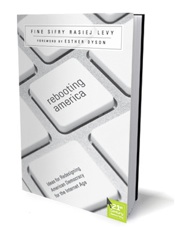November, 2008
Incidentalomas
An incidentaloma according to wikipedia is “a tumor (-oma) found by coincidence (incidental) without clinical symptoms or suspicion.” The provocative NY Times article below suggests that indolent tumors (i.e. ones that do not need treatment) may come and go as a normal part of life. With better detection tools, we are finding more and more of these. However our protocol for dealing with tumors is based on a time when tumors found were almost always non-incidental, non-indolent and requiring of positive action (like surgery). According to Dr. Donald A. Berry, chairman of the department of biostatistics at M. D. Anderson Cancer Center:
…It’s possible that we all have cells that are cancerous and that grow a bit before being dumped by the body. ‘Hell bent for leather’ early detection research will lead to finding some of them. What will be the consequence? Prophylactic removal of organs in the masses? It’s really scary.
Rebooting America
Anyone interested in how technology and policy can work together to form us a more perfect union should read Rebooting America. If your budget is tight right now, you can download the PDF version for free.
While you are at it, check out the Personal Democracy Forum which is the larger effort that Rebooting America is part of.
…“Never doubt that a small group of thoughtful, committed people can change the world. Indeed. It is the only thing that ever has.”
Margaret Mead
Superorganism and Singularity
There is an aspect to The Singularity which is not discussed much, an orthogonal dimension that is already taking shape, and which is perhaps more significant than what is implied by the “standard definition”:
…The Singularity represents an “event horizon” in the predictability of human technological development past which present models of the future may cease to give reliable answers, following the creation of strong AI or the enhancement of human intelligence. (Definition taken from The Singularity Summit website)
AT&T Stepped Up to the Plate and Made Things Right
When I emailed AT&T about an outrageous international roaming charge that I wanted reversed, I wasn’t expecting much in the way of a positive response. But I got one, and I am making good on my promise to let people know about it. If anything is a complex system, cell phone customer service certainly is, so I view this as on topic :-)…
Metabolism Boosters
Pop Quiz: what are the four ways that vegetables and fruits act as a superstar health shield? Find out here.
Click here for more Dr. Ann videos.…
Obama's Must Do List
Everybody has their wishlist and “must do” lists for the new President. Back in March of 2007, the NY Times published this Op Ed piece that I personally believe is critical and outlines what needs to be done above all else. The article goes into much more detail about specifics, but the overall thrust is threefold:
- Restore Habeas Corpus
- Stop Illegal Spying
- Ban Torture, Really
I’m curious to know though, what do you think the priorities should be for Obama’s presidency?…
The Conflict Between Complex Systems and Reductionism
The following is a recent paper by Henry Heng published in JAMA. I’ve linked concepts mentioned in the paper to corresponding explications from this blog.
JAMA. 2008;300(13):1580-1581.
The Conflict Between Complex Systems and Reductionism
Henry H. Q. Heng, PhD
Author Affiliations: Center for Molecular Medicine and Genetics, Wayne State University School of Medicine, Detroit, Michigan.
Descartes’ reductionist principle has had a profound influence on medicine. Similar to repairing a clock in which each broken part is fixed in order, investigators have attempted to discover causal relationships among key components of an individual and to treat those components accordingly. …
How Grandma Saved Democracy
Visiting my 90 year old grandma a couple of weeks ago, I saw the opportunity for a product that I think would have a lot of success in the marketplace. Like the iPhone though, it’s not so much the idea — I’m sure someone is working on or already has the idea — but rather in the implementation and interface.…
From the Heart
I have a bicuspid aortic valve, a congenital condition which exists in up to 2% of the general population:
…
Autocatalytic Systems
The above is a self-replicating dynamic structure from a class of systems called cellular automata (click here to run the simulation). Below is a self-replicating dynamic structure from a class of systems called “life”:…
Invisible Etiology
One of the most poignant moments of this year’s Pop!Tech for me — which, BTW had many — was Gary Slutkin’s talk on the idea of violence being a virus. You may have heard about his work in stopping violence in Chicago in a NY Times Magazine cover article earlier this year. The premise is simple: if you throw out what you think you know about violence and just look at the etiology of how it manifests in the world, you find incredible similarities to the etiology of microbial viruses. This includes not only how it spreads from person to person, but also the larger epidemiological patterns, and importantly, how it can be stopped via interventions which logically follow from the hypothesis that violence is a virus. Not that violence is caused by those invisible critters we call viruses, but rather that violence itself is a virus.…
Crowdsourcing Election Verification, part 2
Back in June, I suggested that public voting records would be healthy for our democracy if the populace were comfortable revealing their voting records. There is now a movement* and new web site for this called Who Voted? though they are not going as far as I am in advocating for revealing your actual choices.…



What is Cancer?
[ I’m asking for your help in answering this question, read past the fold to see how ]
In my post on invisible etiology, I challenged us all to be as open-minded as possible when dealing with our most complex problems, for this is the only way to make the invisible become visible. Here’s where I attempt to practice what I preach.…
Blog Comment, Cancer, Causality, Crowdsourcing, Invisible Etiology, Pop!Tech, Science Blog Comment, Cancer, Causality, Crowdsourcing, Invisible Etiology, Pop!Tech, Science, 0